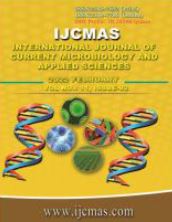


 National Academy of Agricultural Sciences (NAAS)
National Academy of Agricultural Sciences (NAAS)

|
PRINT ISSN : 2319-7692
Online ISSN : 2319-7706 Issues : 12 per year Publisher : Excellent Publishers Email : editorijcmas@gmail.com / submit@ijcmas.com Editor-in-chief: Dr.M.Prakash Index Copernicus ICV 2018: 95.39 NAAS RATING 2020: 5.38 |
Understanding the magnitude and pattern of genetic variability is important for developing superior genotypes with maximum yield potential. A field experiment of twelve maize genotypes was evaluated for growth, yield and yield attributing components during kharif and summer seasons of 2017 and 2018. The magnitude of genetic variability, heritability, genetic advance as a percent of mean, phenotypic and genotypic correlation of growth, yield and yield components was assessed. Pooled analysis of variation revealed that, among the maize genotypes, the differences for growth, biomass and yield traits were highly significant (p < 0.01), indicating the presence of considerable genetic variability. The range of PCV for all traits was higher (12.14-47.59%) as compared to the corresponding GCV (12.09-47.47%), revealing that there was an environmental impact on the performance of the genotypes. The grain yield was highly and positively correlated with total biomass, vegetative biomass, cob weight, kernel number and 100 kernel weight, therefore direct selection of these traits might bring an improvement in grain yield. However, higher estimate of GCV (%), H2 (%) and GAM were recorded with total biomass (43.4, 99.7, and 89.4%), vegetative biomass (47.4, 99.5, 97.5%), cob weight (41.9, 99.6, 86.1%), and grain yield (38.3, 98.9, 78.6%) respectively. Therefore, maize genotypes with these high heritable traits associated with high estimate of GCV and GAM can serve as base population to develop superior maize cultivars.
 |
 |
 |
 |
 |